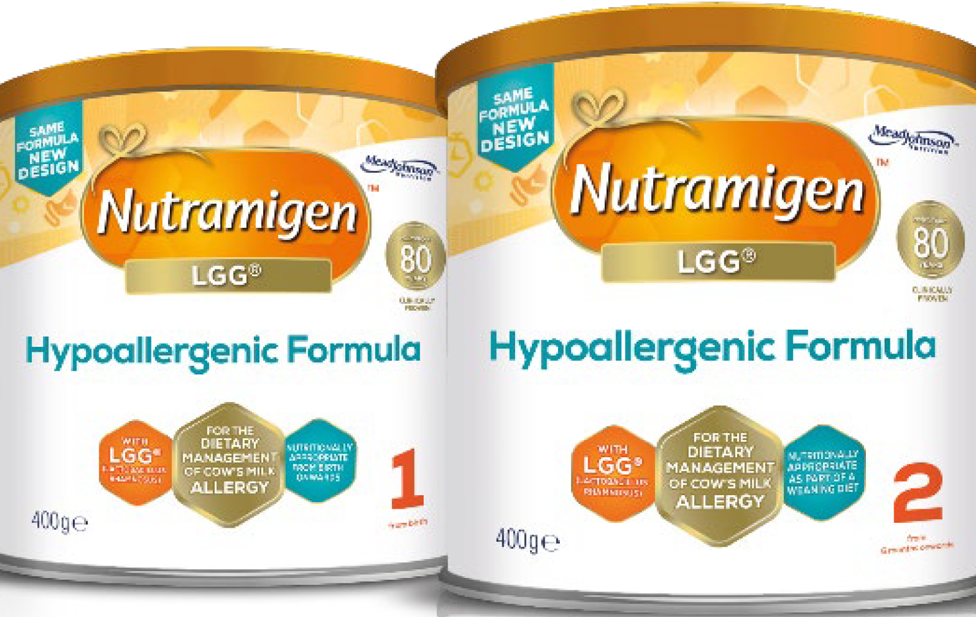Baby formula recalled over bacteria contamination fears
- Published

The Nutramigen stage 1 and 2 baby formula powders are used for babies with cow's milk protein allergy
Batches of two baby formulas have been recalled over the possible presence of a bacteria which can cause fever and diarrhoea.
Cronobacter sakazakii can also lead to sepsis or meningitis in severe cases.
The recall is for the Nutramigen stage 1 and stage 2 hypoallergenic formula powders.
Manufacturer Reckitt took the precaution after bacteria was found in an "isolated overseas sample", it said.
The UK Health Security Agency (UKHSA) says it is not aware of any cases of illness linked to the formulas.
Both of the formula powders are usually medically prescribed, but can also be bought without a prescription, according to the UK Food Standards Agency (FSA).
They are often used for infants with a cow's milk protein allergy, which is estimated to affect around 7% of babies under 1 - though most children grow out of it, external.
The batch codes are ZL3F7D for the stage 1 product and ZL3FAA and ZL3FDM for stage 2.
All recalled products have a best before date of 1 July 2025 and the pack size is 400g.
In the recall notice, external, Reckitt said no other batches have been affected and remain safe to use, as do other Nutramigen products.
It said its own extensive testing did not find the bacteria, but that the possible contamination was found by an independent party outside the US and no illnesses or adverse consumer reactions had been reported.
In a statement, the company told the BBC: "Out of an abundance of caution, we have chosen to voluntarily recall these products.
"All products being recalled went through extensive testing before being released and all tested negative for the bacteria. Furthermore, no illnesses or adverse consumer reactions have been reported."
The FSA warned, external affected customers to not feed the product to their babies and return it to the place of purchase.
It said symptoms of meningitis in infants include "poor feeding, irritability, temperature changes, jaundice (yellow skin and whites of the eyes) and abnormal breaths and movements."
Stores and pharmacies have also been made aware of the recall.
Reckitt said it is conducting a thorough investigation.
The UKHSA told the BBC: "Through our surveillance systems, we are not aware of any cases linked to this product."
Certain batches of the Nutramigen formula have also been recalled in the US, according to the Food and Drug Administration (FDA), external.
The incident comes after it was announced last month that a person in Scotland died from E. coli, following an outbreak of the bacterial infection in the UK linked to cheese. It is unclear if the death was caused by the food.
This story was amended on 5 January to make it clearer that Reckitt made the decision to recall the product as a precaution, following a test by an independent party outside the US, but it has not found any trace of bacteria in its own extensive testing.
A statement from Reckitt was also added.
What is sepsis?
Sepsis is a rare, but life-threatening reaction to an infection
It is when the body's immune system attacks the body's own tissues and organs
Babies under 1, particularly those born prematurely or whose mother had an infection during pregnancy, are more likely to get sepsis
Symptoms in babies and young children include blotchy skin and difficulty breathing
More information about sepsis is available on the NHS website., external
What is meningitis?
Meningitis is an infection of the protective membranes that surround the brain and spinal cord
It can be caused by a bacterial or viral infection, and can lead to sepsis
Meningitis is most common in babies, young children, teenagers and young adults
Symptoms include a high temperature, and a rash that does not fade under a glass
More information about meningitis is available on the NHS website. , external
Related Topics
- Published29 December 2023
- Published13 September 2018
- Published25 October 2023
- Published21 September 2023
- Published14 September 2018
- Published6 November 2023